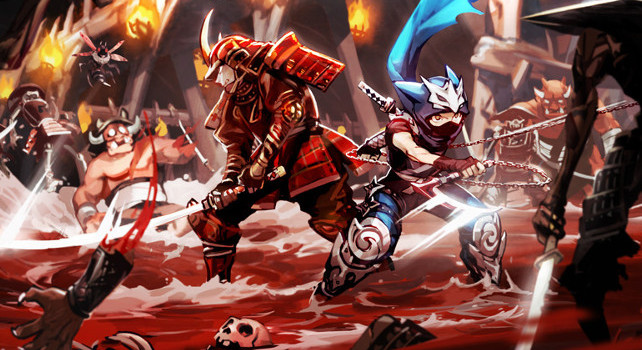
When describing this game to a friend I told him that the game feels like playing Double Dragon, but set in Feudal Japan. While that’s not completely accurate, it does lend to the way that the game feels when you play it. Aside from the fact that the game isn’t a two-player co-op, the game does have a single player “multiplayer” aspect which has some fun to it.
In SADAME one hundred years have passed since the Onin War. Havoc struck the heart of the holy city of Kyoto and the world flooded with evil spirits from the mountains and rivers. This land of Kawanakajima, surrounded by two large rivers, was once known for its fertile soil and praised in many folk songs. But now this land is poisoned, and the people are barely holding on as they live each day in fear of demons and the undead. In the midst of all this, a single traveler comes to Kawanakajima.
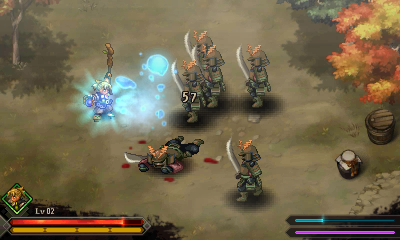
This is where you come in. You can start the game as one of four classes, each with different gear, weapons, and abilities. You can either be a Samurai, Ninja, Monk, or a Rouge. The choice of which class you choose is really a personal decision based on how you play the game, though there is no wrong choice. You can level up, upgrade, and boost your stats of your player as you play, so no one class is at a disadvantage.
Each level you play through is grouped into separate screens. When you enter a screen you’ll have to defeat all of the enemies in the area before you can proceed. In fact there are usually more than one wave of monsters in each screen, so once you fell the last of the monsters, more will appear. There are usually two or three waves of creatures, but they aren’t typically that tough. Especially as you level and gear up.
At the end of each level you will square off with a boss character or monster. While overall I didn’t find these bosses particularly difficult, it should be noted that they look fantastic. The entire game is done in a classic pixel style, very reminiscent of the SNES era. The sprites and backgrounds are all masterfully crafted, with the bosses the cherry on the top. The look and design of these bosses are spot on and very detailed.
Throughout the levels there are lots of items to be found. Through breaking open boxes or barrels, as well as opening chests, you can collect items and gear which can be equipped between levels. You can find cash and items to restore your health as well. There is also a merchant occasionally hidden in the levels, and if you free him then he will also be available between levels to do a bit of shopping. Not only do the boxes and barrels hide items, but many of the enemies drop items as well.
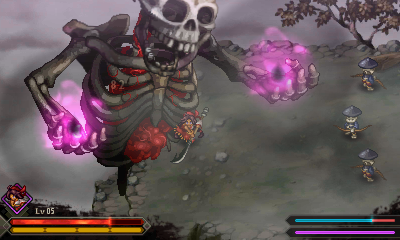
The amount of weapons and armour in the game is massive. While weapons are specific to each class, some gear can be equipped by any of the four classes. However each weapon and piece of armour has a spell attached, which is class specific. For example as a Rogue you can equip an item called hood, however you won’t be able to set and use the spell attached called “Leviathan” because it is specific to the Monk class.
This really adds some strategy and depth to the armour and spell system. Do you go strictly for the highest melee defence stat on armour, or do you equip an item with lower defense that also has a spell you can cast. Or do you focus your attention on the special abilities of that piece or armour. Perhaps one point less in defense will be worth it if the piece of armour has an HP boost, increased recovery percentage or maybe even a boost in defense to certain types of magic attacks. There are literally hundreds of different pieces of armour throughout the game.
And you can share all of it between every character saved on your system.
You can have up to eight save files on the game, allowing you to try out any and all of the classes. And the best part of this is that if you’ve played through the game for a bit as one class, like I did with the Rogue, when you start the game as another class you’ll get to share in that pool of items. So your level 1 Ninja will start with the ability to choose from a vast assortment of armour and weapons that your other character had already collected.
Earlier I mentioned single-player multiplayer. While SADAME doesn’t let you play true multiplayer with a friend, either online or local, it does allow you to play co-op with a computer controlled partner. And that partner is from one of your other saves. Starting off as a level 1 Ninja? Why not ask for an assist from your level 12 Rogue. That other character will fight by your side until the end, or until you change your mind. So while it’s not true multiplayer, it is definitely a cool idea and certainly helpful.
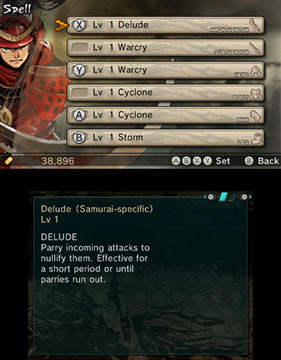
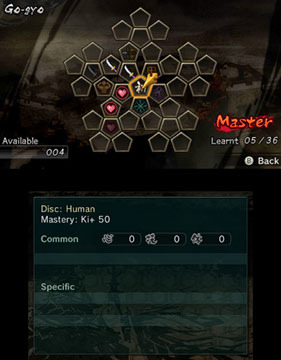
If you have Streetpass enabled, you can also select characters from other players you may have come across out in the world as well.
Another element which can be upgraded is a skill tree. In the Go-gyo section when you customize menu, you can use discipline points you earn by leveling up to upgrade your health, attack, defense, as well as the elements in the spells. There is a huge tree of upgrades to go through and this really helps you if you want to focus on growing your character in a specific way.
The last thing I’m going to touch on is the soundtrack. Some games have great soundtracks and this game is in great company with many of them. The music is so fitting to the era of the game, and also so well done that I would have loved to have a jukebox setting in the menu so I could just sit back and enjoy the music. I sometimes found myself booting up the game and pausing a level so that I could enjoy the soundtrack whilst doing other things … like writing this review.
SADAME is definitely a fun action-RPG which looks and sounds amazing. It’s priced a bit higher at $14.99 than some other games on the eShop, especially without any name recognition or history there. If you like hack-and-slash action RPGs and have an affinity for Japan then this will definitely interest you. If you are interested but aren’t sold, keep an eye on here for any upcoming sales. SADAME is great fun. You won’t be disappointed.



